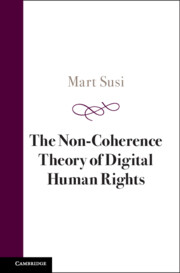Book contents
- The Non-coherence Theory of Digital Human Rights
- The Non-coherence Theory of Digital Human Rights
- Copyright page
- Contents
- Acknowledgements
- Introduction
- Part I The Contextual Challenges and Purpose of the Non-coherence Theory of Digital Human Rights
- Part II Reflections on Some Theories and Doctrines
- 6 The Doctrine of the Sameness of Rights Online and Offline
- 7 Claims of New Internet-Specific Human Rights
- 8 The Capabilities Approach
- 9 The Frankfurt School and the Normative Order of the Internet
- 10 The Articulation and Critical Review of Self-Normativity
- 11 The Transversality Principle (Teubner)
- 12 Network Society Approach (Castells)
- Part III The Core Elements of Non-coherence Theory
- Part IV The Impact of the Non-coherence Theory
- Part V Internet Balancing Formula
- In Lieu of the Concluding Remarks
- Index
10 - The Articulation and Critical Review of Self-Normativity
from Part II - Reflections on Some Theories and Doctrines
Published online by Cambridge University Press: 22 February 2024
- The Non-coherence Theory of Digital Human Rights
- The Non-coherence Theory of Digital Human Rights
- Copyright page
- Contents
- Acknowledgements
- Introduction
- Part I The Contextual Challenges and Purpose of the Non-coherence Theory of Digital Human Rights
- Part II Reflections on Some Theories and Doctrines
- 6 The Doctrine of the Sameness of Rights Online and Offline
- 7 Claims of New Internet-Specific Human Rights
- 8 The Capabilities Approach
- 9 The Frankfurt School and the Normative Order of the Internet
- 10 The Articulation and Critical Review of Self-Normativity
- 11 The Transversality Principle (Teubner)
- 12 Network Society Approach (Castells)
- Part III The Core Elements of Non-coherence Theory
- Part IV The Impact of the Non-coherence Theory
- Part V Internet Balancing Formula
- In Lieu of the Concluding Remarks
- Index
Summary
Objections against digital self-normativity are primarily related to questioning whether a moral dimension is embedded in the normative function of algorithms, and the increase in predictive power connected to the automatic implementation of norms. These matters concern secondary level rules of implementation and practice but are often thought to reflect the moral dimension of digital primary norms. There appears no comparable continuum between self-made private rules and international or domestic legal instruments governing digital human rights. I term such an absence as the idealism abyss; that is, the idealistic nature inherent in human rights articulated by positive legal instruments is not carried as uninterrupted into the self-normativity of digital agents. Once the self-normativity of digital private enterprises becomes justified, the idealism abyss leads to the necessity of self-constitutionality. In this case, primary and secondary self-regulation form one logical structure. The rejection of the idealism abyss shows an image where the self-made secondary norms rely on primary- (constitutional-) level norms originating from the non-digital realm, but their content may have changed in the course of the transposition.
Keywords
- Type
- Chapter
- Information
- The Non-Coherence Theory of Digital Human Rights , pp. 108 - 120Publisher: Cambridge University PressPrint publication year: 2024



